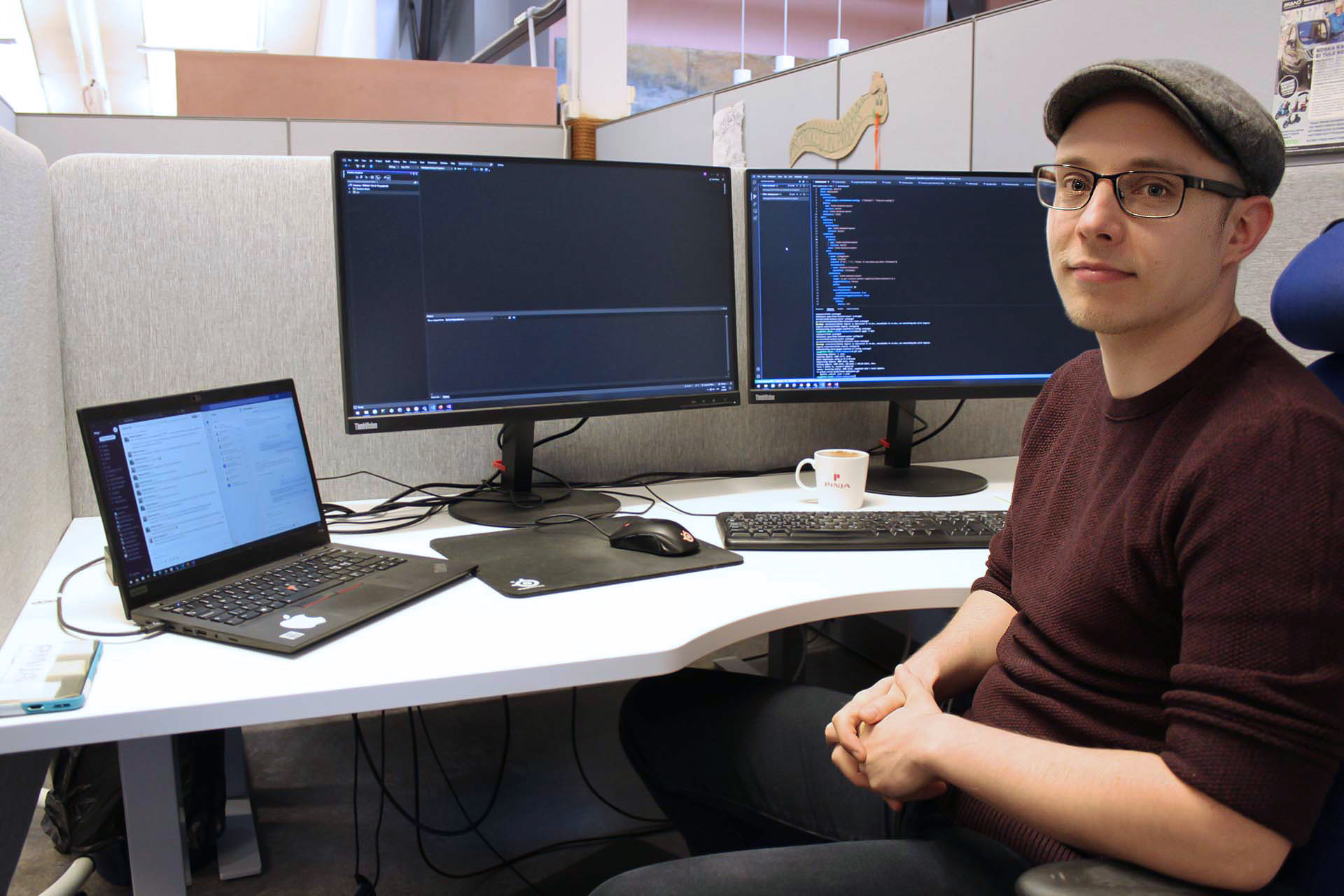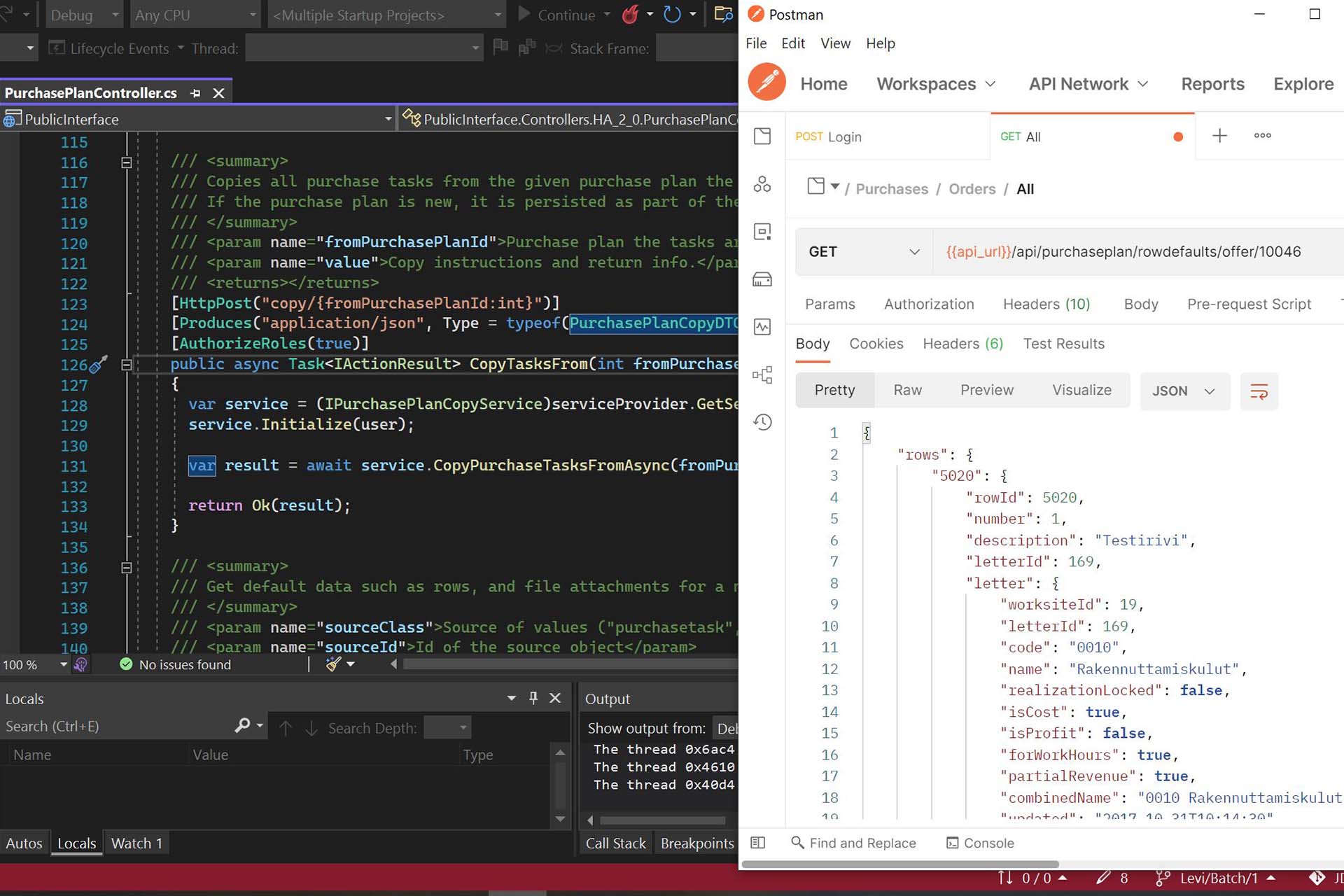
Roni Palva-aho is a software developer with over 6 years of experience working at Pinja. Roni started working as a student trainee, and has since worked in a full-stack developer role. The broad perspective of full-stack software development suits Roni well, and he says he particularly enjoys the variety of the work and the building of complete systems. There are many different routes to becoming a full-stack developer – in Roni’s case, the initial idea came during his graphic design studies, when he also found himself being interested in technologies behind user interfaces.
Software developer Roni Palva-aho’s work at Pinja currently focuses on two areas. Half of the time he works in systems development for a client company in the software industry, and the other half on an information service provided by a non-profit association. In the past, Roni worked on developing, among other things, the Novi by Pinja maintenance system.
At Pinja, I have the opportunity to work on projects that involve the design of user interfaces, the underlying databases, and the interfaces to the solution in a relatively traditional model.
Roni has more than six years of experience working at Pinja, of which he has been working as a full-stack developer after his initial internship.
- Pinja provides a nice variety of projects and a wide range of options for employees, which is a definite plus for me. I like that I can challenge myself at work, and the employer also sets aside time for employees’ own continuous development and training. The team is also nice to work with, so I’ve had a good time, says Roni.A full-stack developer identifies client needs and solves problems
Jyväskylä-based Roni Palva-aho’s path to Pinja and the full-stack developer role started from graphic design, art and web design, i.e. the front end. While studying media technology at the Jyväskylä University of Applied Sciences, he noticed that his interest was also strongly oriented towards the back-end, i.e. the underlying web technologies and databases. Since 2016, Roni has been working as a full-stack developer on projects combining both areas.

- At Pinja, I have the opportunity to work on projects that involve the design of user interfaces, the underlying databases, and the interfaces to the solution in a relatively traditional model. These systems often handle, for example, the business data of the company in question. On the other hand, I have also worked on a project related to telemetry and thermal data, for example, which involved cloud-based data analysis and the related integrations. I also work in software development for Pinja’s products, Roni says.
The tools and technologies for each project are selected according to the task at hand by a joint decision of the team. However, the solution to be used in legacy projects that build on past history may come pre-determined. At the moment, Roni works mostly with .NET and Angular technologies, in addition to some PHP. For a better part of the day, Roni has Visual Studio and VS Code open side by side on his screen.
While technology and programming language skills are important in the workplace, Roni says that not knowing a particular language or technology is not an obstacle for a new employee.
- In any case, the job description in a new job involves learning new things and customer relations, and getting to know the company’s operating models. You will learn new languages and technologies. Even in the role of a full-stack developer, the core competencies are in a way technology-independent. The key to the job is identifying client needs, and problem solving, Roni says.Specialists and generalists
Some of Pinja’s developers work as front-end developers, some as back-end developers, and some as full-stack developers. Of them, front-end developers focus primarily on the user interface visible to the end user, back-end developers on the databases and logic underlying the user interface, and full-stack developers on a combination of the two.
But does a full-stack developer feel that they are somehow more advanced than the other two?
- I wouldn’t say that, Roni laughs.
- Rather, I think it’s a question of some people being more naturally suited to a particular sector than others, and both types of talents are needed. Some developers are more specialized in a limited area, while I am more of a generalist in my role as a full-stack developer. So, the perspectives are just a little different, Roni sums up.
Roni describes the practical work as, above all, teamwork. In his role, his closest colleagues are other software developers, project managers, scrum masters, product owners and architects who may work on projects. Roni also does some direct client work.
- Client work is kind of a logical part of my full-stack developer job description, and I like it. My communication with clients is very much focused around my practical work, which is different from the role of a salesperson, for example. I find it rewarding to get to know a client’s business and I feel I can meet their needs, Roni says.
Fact box:
💎 A front-end developer creates the visual side of a website or service, and determines, among other things, the locations and functionality of elements. Technologies used by the front-end developer include Angular, React, Vue.js, and Bootstrap. The most common languages include HTML, CSS, Sass, JavaScript and TypeScript.💎 A back-end developer develops what happens behind the finished product that is visible to the end user. Typically, this includes work on databases and logic, for example. The technologies and languages used by the back-end developer include C#, PHP, Python, Java, ASP.NET and Symfony.
💎 A full-stack developer is a combination of the previous two, i.e., a person who does both front-end and back-end software development. A full-stack developer uses both front-end and back-end software development technologies.
Apply now:
Read more:
A back-end developer is the enabler behind the user interface
A front-end developer develops software from an end user perspective
Pinja enables flexible working models
The “Finnish champion” of web development works at Pinja
Back to the Pinja Blog
Categories
- Career at Pinja (68)
- Manufacturing (46)
- Knowledge Management (45)
- Production Development (44)
- Software Partnership & Tools (42)
- Sustainability (37)
- Wood and Forestry (37)
- Bioenergy and Recycling (29)
- IT Support and Outsourcing (24)
- Ecommerce (23)
- Maintenance (22)
- Artificial Intelligence and Machine Learning (15)
- Public Services (9)
- Compliance (1)
